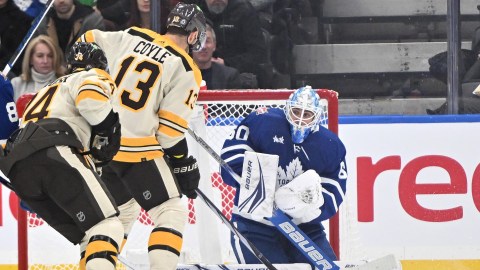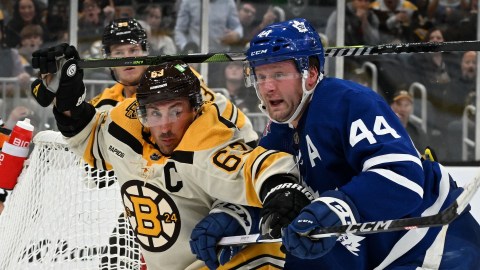 All that matters are championships.
All that matters are championships.
That is the traditional narrative in sports, but great players, teams and organizations do not always finish on top of the world. Even when they give 100 effort 100 percent of the time, they aren’t guaranteed to take home a title.
Look at the 2013 Boston Bruins. Does losing to the Chicago Blackhawks in the Stanley Cup Final mean they aren’t champions?
What about the 2013 San Antonio Spurs? Are they champions after falling to the Miami Heat in seven games?
How about the 2011 and 2007 Patriots, 2010 Celtics, 1994 Knicks, 1986 Red Sox or 1984 Lakers?
All of those teams lost the last game of their respective seasons. The list is just a small sampling. Many teams have had a chance to win it all and didn’t. All of those teams were great. All of those teams are still champions. Not by the Merriam-Webster standard, but in the John Wooden “Pyramid of Success” sense.
Wooden believed “success is peace of mind which is a direct result of self-satisfaction in knowing you made the effort to become the best of which you are capable.”
That definition of success applies beyond the basketball court, hockey rink, football field or baseball diamond. Life, like a championship game, can be a hard-fought struggle. Every day, everyday folks hustle to make an honest living, support a family, keep a roof overhead, put food on the table, scrap for respect, fight for justice, seek peace, give love and spread decency.
As long as a person embraces the challenges of life each day, competes to the best of his/her ability and strives for excellence, that person is a champion. This approach applies to any profession — from ditch digger to president of the United States. Money doesn’t define success, just like rings don’t define champions.
Being a champion is a state of mind. The key is finding enjoyment in the grind, the big game, the experience. Only a handful of teams and players in sports in their careers are fortunate enough to get in position to vie for a title. The road to glory is the result of hard work and everything falling in place. Fortune favors the bold, but breaks have to favor the victors. One slip, one fall, one bad call, one misstep, one injury, one inch – and immortality is reversed, legacies changed forever. Sometimes, the line between winning and losing is razor thin.
So why are we so quick to forget the vanquished once the final buzzer sounds, the final out is recorded and the final chapter of the story ends? We have been conditioned to believe that anything less than being No. 1 is not worth celebrating. But sports aren’t black-and-white absolute. Neither is life.
Just like championship teams can lose, people go through life and face adversity. People get knocked down. Champions get back up. People face obstacles. Champions overcome them. There is no shame in losing when blood, sweat and tears have been exhausted. The only shame is not showing up.
We can learn from teams that miss glory bythatmuch, same as we can learn from teams that ride off into the sunset without breaking stride. In fact, the lessons are more profound.
Take Gregg Popovich, one of the best in coaches in NBA history and a future Hall of Famer. This consummate winner coached the losing team in the NBA Finals this season. Instead of sulking after the final horn sounded to signal the Spurs dropped Game 7, Pop was one of the first people to congratulate the Heat on the court, front and center, giving LeBron James and Dwyane Wade big bear hugs, shaking hands with Erik Spoelstra, all with a smile. That is class. That is winning. That is the essence of being a champion.
No one wants to lose, but stuff happens. Pop will be back. The Spurs will be back. Champions don’t stay on the mat.
The same is true of Patrice Bergeron, Gregory Campbell and the Bruins. Even though they didn’t bring the Cup back to Boston, they earned respect by playing through pain, competing with courage and leaving everything on the ice. No one will forget the heart and soul they showed. They sacrificed personal health for team success. They raised up a wounded city. They are the epitome of champions.
If winning championships were easy, every team would get a Stanley Cup, Lombardi Trophy, Larry O’Brien Trophy or Commissioner’s Trophy every year. If life were easy, everyone would be driving a Rolls Royce and living in a mansion overlooking the ocean. But we don’t live in a “here’s a trophy for participation” world, despite the best misguided intentions of the PC crowd.
We live in a “what have you done for me lately” society. Champions get $100,000 bar tabs comped, a parade, key to the city and lifetime of glory. The losing side gets an obligatory interview outside the locker room and an offseason of forever to reflect on what might have been.
Pat Riley famously said, “There is winning. And then there is misery.” The NBA’s Godfather and Heat architect is right. Losing hurts and leaves a painful emotional scar. The bigger the stakes, the greater the pain.
However, there’s a flip side. Misery doesn’t have to be viewed as a negative. Valuable lessons can be taken from losses. Coaches and players can learn from in-game adjustments that flopped, X-and-O strategies that didn’t work, failures. They can learn what needs to be done to beat the champions and be champions. This is true in any field. Companies can learn from past mistakes and apply the lessons to future work to beat the competition and be an industry leader.
That is why Pop was smiling after losing to the Heat. He wasn’t happy to lose and miss out on winning his fifth NBA championship, but he knew the pain of losing can used as motivation to get better. Disappointment can lead to triumph. The suffering can be viewed as a win.
Shaking hands with the Blackhawks after Game 6 was one of the emptiest feelings the Bruins will ever experience. They can turn that sadness into fuel, rebound from their heartbreaking Stanley Cup defeat and return stronger.
The ultimate goal in sports is to win a championship. The ultimate goal in life is the same. Great organizations strive to be the best every year. They plan, practice and prepare to achieve such success. They assemble the proper pieces, build chemistry and learn to work together to win a championship. Great people do the same. They work hard to have “a good life,” the feeling that is synonymous with the joy that comes after winning a Stanley Cup, NBA title or any championship. The work starts at home, extends at work and into the community, and can have a major impact on a global scale.
Imagine if everyone in the world strived to be a champion and make the world a better place for everyone. We know this isn’t the case, just like we know not all organizations care to be champions. We can learn from those people also.
Being ahead on the scoreboard isn’t the only way to win a game. And having the most hardware isn’t the only way to measure a champion.
Not everyone gets a ring in sports. But everyone has the opportunity to win a championship in life and live like a champion — by being a quality person, a good mother or father, daughter or son, coworker, friend. The pursuit of championships is a daily, conscious choice.
So choose wisely.
The reward is the journey.



